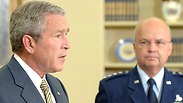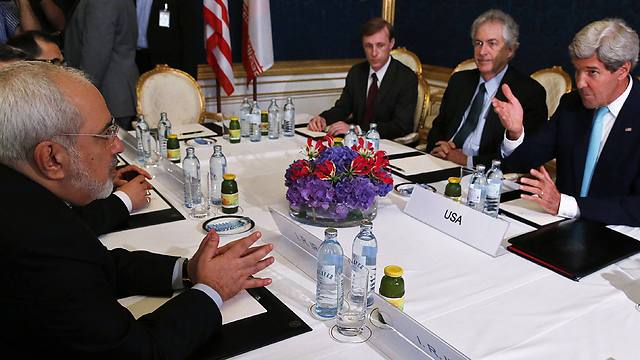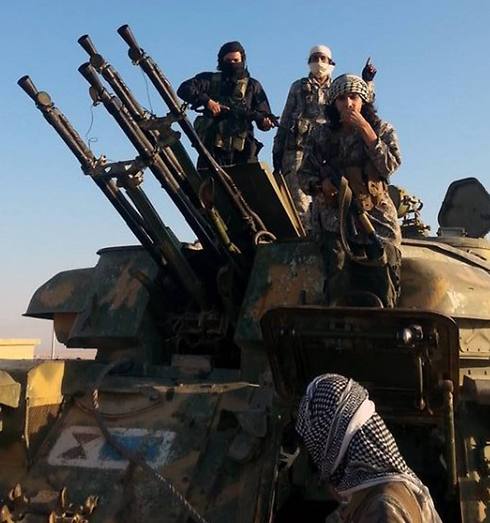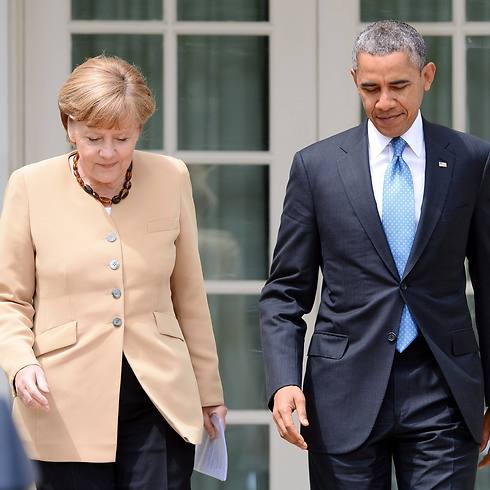
Hayden: Treat Islamic State like we did al-Qaeda
In second part of exclusive interview, US intelligence doyen Michael Hayden discusses targeted killings, dealing with Iran, US-Israel ties, the fallout from wiretapping Merkel - and theorizes why it happened.
General Michael Hayden, the most prominent figure in the US intelligence community in recent decades, says he does not envy current NSA Director, who is charged with rebuilding the agency after the "serious blow" of the Snowden leaks. Thirteen years after the fall of the twin towers, Hayden meets Ronen Bergman in Manhattan, to discuss the revolution in American intelligence after 9/11, how he persuaded Bush to launch targeted killings of top al-Qaeda officials, his close ties to a Mossad chief, what is needed to defeat ISIS, why the world's biggest intelligence agency is peeking into your Gmail, and what this all has do with Angry Birds.
Part two of an exclusive interview. Click here for Part One.
The intense cooperation between the American intelligence community and Israel began in the 1960s, but during Hayden's tenure the relationship reached new heights. The Israelis who worked opposite him, including the former head of Military Intelligence General Aharon Ze'evi Farkash and former Mossad chief Meir Dagan, praise him at every opportunity. On the wall of Farkash's office hangs a special decoration, wrapped in an American flag, an extraordinary award from Hayden.
"We cooperate with a variety of nations. And those cases where we have common interests or common concerns and common dangers, our cooperation is more intense."
For example?
"Israel and the United States absolutely have shared concerns, such as Iran, the spread of weapons of mass destruction and terrorism. In my discussions with Israeli counterparts, we don’t usually have any disagreement about the basic facts. Now, Israeli estimates and American estimates are sometimes different, especially when it comes to Iran."
You're talking about the time scale for their ability to produce a nuclear weapon?
"Yes. There may be eight data points between the beginning and the conclusion, and each data point has a range that allows us to estimate in various ways exactly where the Iranians are. We Americans might take the middle road on each data point, and at the end of it we'll say, 'they can have a weapon in 18 months'. The Israelis will look at the same information, and come up with a far shorter timeframe. You are a lot closer to the danger. I understand perfectly. If I were an Israeli intelligence officer, I wouldn’t split the difference."
The New York Times wrote there was cooperation in operation "Olympic Games" between the US and the Mossad and the IDF's Unit 8200, to build the "Stuxnet" virus that attacked Iranian nuclear facilities, a cooperation of which you were the chief.
"It would be irresponsible for someone of my background and the positions I have held to even speculate about the matter you just mentioned.
Do you feel you have managed to get a better intelligence understanding of Iran?
"Yes, but Iran always remained a very hard target. I had two kinds of questions about Iran from President Bush. One was about the nuclear program: How many centrifuges, how much LEU (low-enriched uranium). In short, how long it would take them to get the bomb."
And the second?
"And the other one was: How do they think? How do these guys make a decision? How does the government work? I'll tell you the truth, Ronen, I always wanted the first questions, and not the second. We could do the concrete physical stuff pretty well. But it is very, very hard for us to understand Iranian decision-making. The goal of American policy was to change the Iranians' minds. If that's your goal, how do they make a decision? Who makes the decision beyond the Supreme Leader? Who does he listen to? What do they view to be important? It is very, very hard for us to gather sufficient intelligence to answer these questions."

Maybe it is harder for you because this kind of information comes normally from live sources and not from technological sources.
"There is no doubt that you can answer many questions a lot more easily with technology but human sources are required too"
No disrespect to you as former CIA chief, but do you get the sense that the US is a lot stronger on intelligence technology and what Israel brings to the table is more strength in running human assets?
"I'm not offended. I'll speak in slightly generalized terms. We have a lot of relationships around the world; and in these situations, here's what we bring: We're big, we're rich, technologically sophisticated, and we're global. What do our partners bring? They're small, they're focused and they're culturally and linguistically smart and relevant to the targets."
Sometimes from a cultural and personal perspective there is also a great difference. I understand that from an American perspective, to meet someone as bold as Meir Dagan is a little unusual, at least the first few times.
"I know Meir Dagan very well. We have a good friendship, we continue to have a good friendship. I certainly respect him and I think it's mutual. We have a phrase in the CIA: I've got a lot of time for him – that applies to Meir Dagan. That also applies to (former Military Intelligence director General) Amos Yadlin.
* * *
"I went to President Bush and I said: 'We've got to act. Although we no longer have the ability to capture, we have got to take these people off the battlefield, one way or the other.'"
* * *
Israel has just waged a war with Hamas, during which it sustained sharp international criticism over the issue of civilian casualties. Do you think there is a "gentle" way to handle jihadist movements?
"Democracies are today really faced with this question. How do you defend yourself against such people? I must admitted that I was more tolerant of Israel's actions than some other Americans were, but even for me the human toll was very sad."
Is Hamas also a target for the United States?
"In an intelligence sense, of course."
You were one of the main supporters of the mass introduction of assassinations as a leading method of waging the war on terror.
"We don't view these as assassinations. They are attacks against enemy combatants. My country made a decision to do targeted killings. The first such incident was in October 2002 in Yemen. After that there were targeted killings every now and then, here and there, but it was very infrequent. And then beginning in 2008, it became very intensive. We started a heavy campaign of targeted killings. What changed was the degree of threat. It didn’t happen all at once, it was rather a process that lasted a long time."
Why didn’t you use targeted killings earlier?
"If you look at the history, during the period between 2002-2006, that is the first part of the global war on terror, we were capturing people, lots of people, far more than killing them. Beginning about the end of 2006, start of 2007, the situation changed. Our ability to capture, not our willingness, weakened greatly."
What caused it? Strong international criticism about the arrests and renditions? The images coming from Guantanamo?
"No, no," says Hayden with a dismissive wave of his hand that illustrates better than anything what he thinks about the protests primarily in Europe. "It was because the enemy got smart. For example, we had many, many captures in the settled regions of Pakistan - Khaled Sheikh Mohammed (senior al-Qaeda member and one of the masterminds behind 9/11), Abu Zubeida (senior bin Laden aide), and others. Al-Qaeda learned their lesson; they were up in the tribal region in the mountains, in Waziristan on the Pakistan-Afghanistan border. These were places where neither we nor the Pakistani intelligence service could reach them freely.
"And beginning in late 2007, early 2008, a very worrying intelligence picture emerged: We saw a resurgence of al-Qaeda in the tribal regions. It was not just a linear al-Qaeda threat, it began to change; it became stronger and greater because of the safe haven they had there. I went to President Bush and I said: 'We've got to act. Although we no longer have the ability to capture, we have got to take these people off the battlefield, one way or the other.'"
* * *
"Israel is probably the only other country in the world who thinks like the United States – that targeted killings are legal. I think it's legal, I really do it. but we don’t have a friend in the world who thinks targeted killings are legal other than Israel."
* * *
Was it difficult to persuade the president to move to a strategy of targeted killings?
"Number one, you have to convince the president you know what you're doing. That you know how to track down these specific people and hit them. The situation is complex. These were happening outside of internationally recognized theaters of conflict. They were happening in other people's countries. I'm not going to go into any detail about it, but it was clear to us that there was always great political risk in doing these kinds of things in these places.
"We're talking about a decision that wasn't simple. Israel is probably the only other country in the world who thinks like the United States – that what it is we do there is legal. I think it's legal, I really do it. It's not just boilerplate between me and a reporter but we don’t have a friend in the world who thinks targeted killings are legal other than Israel.
"So if we're going to do it, and we're kind of out there on the edge of international opinion, we'd better do it well. And you’d better be damned sure you know who you’re killing and why. I realize that there has been collateral damage, there have been mistakes - I understand that. But I would also make the point that as a professional, the level of intelligence to do what the United States has done can only be described as exquisite. This is magnificent intelligence to enable that kind of thing – and it had better be.
"It was also totally clear to us that it would alienate some of our friends, mostly Western European friends. We also knew it would help the al-Qaeda recruitment for the next generation of terrorists. All of this we understood full well. But carrying out these operations, the importance of neutralizing these people was of greater value.
"And it worked! The campaign against the tough core of al-Qaeda along the Afghan-Pakistan border is an absolute classic. Those guys are no longer capable of hurting anyone."

But the al-Qaeda No. 2, Ayman al-Zawahiri, is still free and dangerous.
"Agreed. But number one is gone, and a whole bunch of number threes are gone. The chief of operations of al-Qaeda, one took over from another, is also no longer with us. That was about a six-month job."
Israel also tried to hit the Hamas commander of operations. Do you see assassinations like this as having value?
"Absolutely, but I have to point out that you will never hear me use the word 'assassinations.' We don’t carry out assassinations, rather targeted killings. Assassinations are carried out against political enemies. Our targeted killings are against members of an opposing armed enemy force. This is war. This is under the laws of armed conflict."
There are those who would tell you that when you might have hit al-Qaeda only to deal now with ISIS, which is far more extreme.
"Ok, so what do we do? I say, we have to treat the Islamic State the way we have treated al-Qaeda in Waziristan for the last 10 years. Go to where they are and deal with them."
It seems that there was nothing more harmful to the reputation of American intelligence than the revelation of Der Spiegel journalists Holger Stark and Marcel Rosenbach that the NSA had for years been eavesdropping on the cell phone of Chancellor Angela Merkel. A senior American intelligence source told me that the real target when the bugging started was not Merkel, then leader of the opposition, but Chancellor Gerhard Schroeder. The chancellor had at a certain point adopted pro-Russian positions and was strongly opposed to the American invasion of Iraq. After retiring, he drew a great deal of public flak for taking a lucrative position with Russian energy giant Gazprom.
Hayden avoids referring directly to the wiretapping affair, but one can clearly infer the meaning from his words. "I'm not saying we did or we didn’t, but I do want to raise an important point on this issue. People come to me and say 'why Angela Merkel? She was so pro-American. What was the point of it?' So okay, I understand that, but what about the other guy (Schroeder)? If you say it was stupid for the Americans to do because they didn’t need to, but by the same standard, there was a reason to eavesdrop on her predecessor. Was that as stupid? And I think most people would say 'no, I can understand that'."
And did the classified transcripts reveal something about the nature of Schroeder's ties to Russia? To Gazprom?
"I can't answer that question."
Last February, Hayden took part in the Munich Security Conference, the most important forum in the world on military, intelligence and policy affairs. During a series of closed-door conversations, he endured fierce criticism, not to mention great anger and offence, from the Germans present over the eavesdropping on Merkel.
"Spying may or may not endanger trust. Spying and not keeping it secret almost certainly will endanger trust. And if I as an American have anything to apologize for, it's that we were incompetent and that we couldn’t keep activities that are common to all nation states private to us, and thereby put a good friend - and there is no question that both Germany and the chancellor are good friends of the United States – in a position where she was personally offended, and frankly at the political level (placed) in very, very difficult circumstances."
But you can understand German anger?
"There's still part of me that thinks that the German rage was not legitimate, because everybody does it. But after Munich, I have no doubt that the German anger was authentic. There are other countries in Europe where the anger was theater, but in Germany it was authentic.
"What I tell Americans is, we feel kinship with the Germans: we come from the same cultural traditions in Western Europe: democratic, Judeo-Christian; we have similar values. But within that tradition, there's different emphasis. We Americans didn't appreciate that the Germans view privacy the way we Americans view freedom of religion and freedom of speech. The Germans are more comfortable restricting some freedom of speech because of their history.
"There was a German family in the United States that was fighting deportation to Germany, because they were homeschooling their children here for religious reasons. And they wanted asylum because if they went back to Germany it is illegal to homeschool your children in Germany, even for religious reasons. An American looks at that and says 'that's crazy, of course they could homeschool their children. Religious freedom is number one!' We didn’t appreciate that Germans viewed privacy the way we look upon religious freedom. And therefore we weren’t as sensitive as we should have been."
If it is so legitimate, why did the president apologize to Merkel and even promise not to eavesdrop on her anymore?
"It was a very personal no-spy agreement. It was, 'we will not intercept your phone'. It made no mention of American espionage against the Federal Republic, the office of the chancellor or her successor or the vice chancellor. The president went out of his way in his speech when he said 'and we have stopped collection against dozens of foreign leaders' and then the rest of the paragraph specifically pointed out that we however will continue to conduct signals intelligence against governments. And so the personal commitment of the president was to the person of the chancellor."
Do you think that there will now be a no-spy agreement with Germany?
"I am not willing to apologize for legitimate intelligence activity that one country conducts against another country. This is how it's been, and this is how it will be, and this is the reason why there will never be a legally binding non-spying agreement with any of our friends, not even Britain. To my knowledge, this is how it will be in the future."
There have been reports that the NSA tried to intercept emails of senior members of the Israeli government, and that there was an attempt to monitor conversations made by Defense Minister Ehud Barak at his home using a laser device placed outside the window. Do you have any comment on this?
"I really would not have anything to say about that."
What do you believe will be the future of the internet?
"Snowden, in a very perverse way, has put wind into the sails of a group of countries that actually want to end the internet as we know it – countries like China and Russia. We in the West believe that the internet should be free and open. These two countries are trying to impose on the internet the kind of totalitarianism they impose in their physical space. We’re not going to support that. We want the internet to be global, ubiquitous, accessible, unitary, identical and so on. The Snowden revelations will give these countries a new argument. They will say the Americans were arguing for freedom on the internet but really they wanted to spy on everyone."
But one of your people at the NSA actually wrote in internal documents that you wanted to achieve internet "supremacy", to "master" the www.
"Okay, maybe we exaggerated a little with those statements. In retrospect, they may well be a little too dramatic, but none of us really wants to control the Internet or enact laws to limit it."
The Snowden documents that have not yet been released reveal your involvement in certain secret projects – Gladiator, Orient Express, Pyramid, Lion King and more.
Hayden looks at me and smiles, as though he understands that I am teasing him with secret code names. His pupils do not dilate even a little, as he simply says: "I have no views on this matter that I can share."
Translated by Sara Miller











